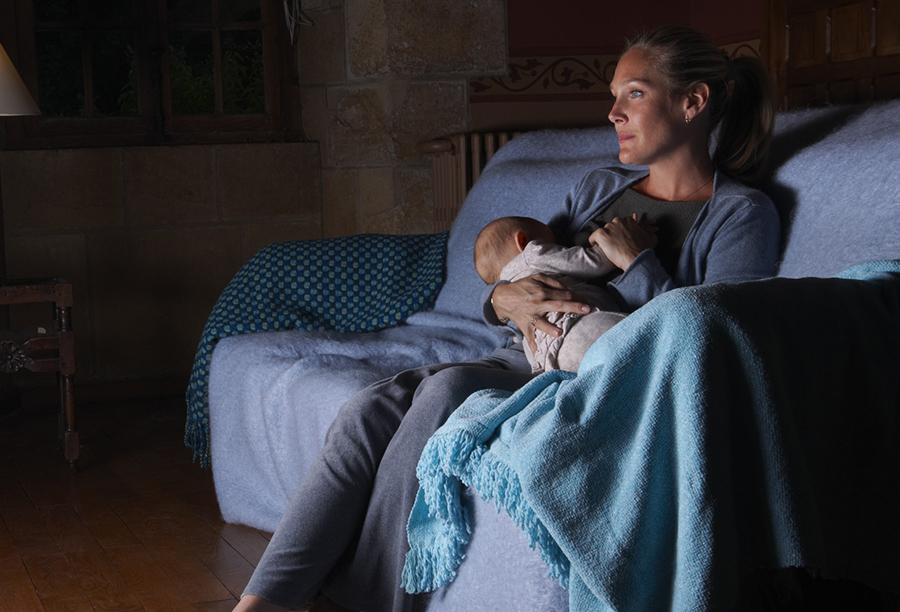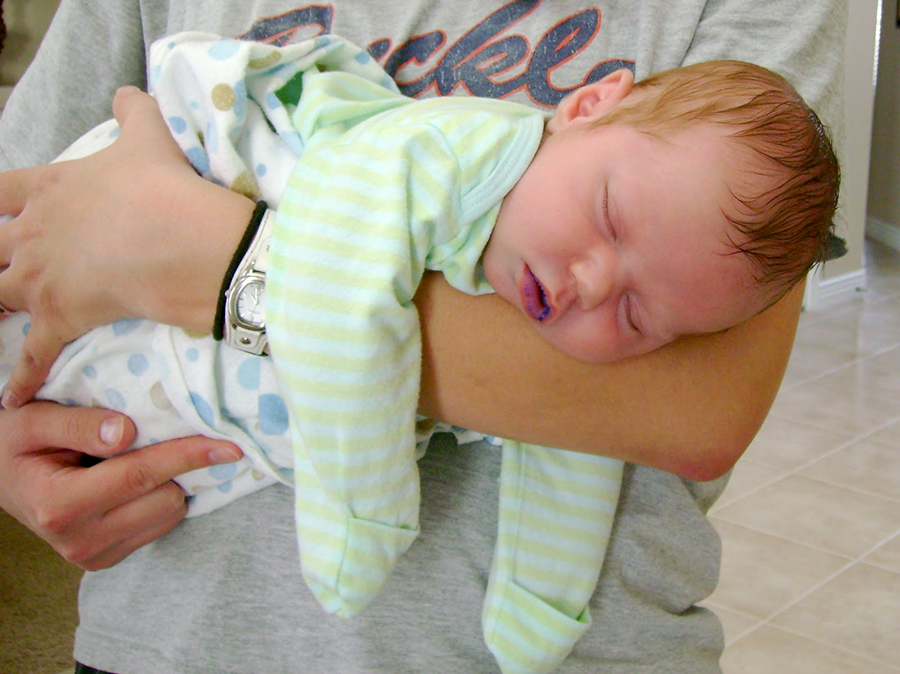Parenting: Good Night’s Sleep
I’m afraid that all the things I know about the topic “sleep problems in infants” rattle around in my brain in a fairly “jumbled” manner. Frankly, the topic of infant sleep is probably the most frequently asked group of questions from new parents and in the “top 3” for all parents; but still….
The reason it’s so “jumbled” is FIRST because the situations surrounding just about every child who keeps their parents up at night longer than they “should” are completely different. So much so, that it’s hard to construct “pigeon holes” for them to fit neatly into.
Infant sleep is often more a parenting issue than a baby issue
But SECOND it’s because the topic is right up there with circumcision, breast feeding and discipline on the scale of: “my mother always told me,” “we’ve already decided,” “but the internet says”. Everyone’s got a “you should do it this way” to share and there’s nothing so entrenched as a “vested interest masquerading as a moral principle” as sadly the internet has become.
The advice and counsel pediatricians offer is so often fraught with “land-mines” that a substantial amount of trepidation produces “tap-dancing,” “couched words” and “half-way compromises” such that building those standard “treatment containers” is fairly impossible.
So, alas and alack, in spite of experience with literally thousands of parent-baby experiences, it still leaves much of the specifics loose to rattle around in my head without much of a place to “roost.”
Parenting: Infant Sleep
Therefore, what I’ll do here is sort of give you a “data dump” of the various observations, experiences, rules and tips I would draw from for our talk if you were sitting in my exam room, exhausted from lack of sleep, and I was trying to offer help without tripping any of your “hot spots” which cause you even more distress or guilt.
Doing it this way lets me believe that you can put the things together in a less emotionally charged way; but of course, I won’t be able to see you start to fidget or your eyes begin to dilate – the tell-tale signs I would normally watch for to see when I was approaching one of your “hot spots.” None-the-less you should be able to draw correct conclusions.
We can begin with three global concepts then list a few basic facts we’ve learned through research and end with some time-revealed parenting tips if we haven’t covered everything.
Concept 1: NOT Sleeping Through The Night is No Accident!
Choosing parenthood puts YOUR good night’s sleep in jeopardy – you knew that going in… right? The specifics about intensity you may not have known but intuitively everyone understands infants don’t come out “plug and play,” “ready to use” or “wash N wear.” Absolutely nothing is included… except the “batteries” – which never, it seems, wear down.
At the two-week visit, parents are always tired and drawn (even if they have a nanny). That’s normal because sleeping through the night, like making their bed, doesn’t happen by accident with kids – the training and maturity takes a few months!
Yes, you heard correctly, “a few months” because sleeping is full of learned behaviors. In fact, by two months of age there are more learned behaviors around sleep than physical ones. But… it does get better – unless they are trained otherwise.
Concept 2: Sleeping THROUGH The Night Is No Accident Either
The most unusual thing the infant experiences after birth is… well… everything! It’s NOT dark anymore. It’s not quiet anymore. There are huge swings in temperature. It’s not crowded, I can eat, I can breath, I can… CRY!
Infants do all kinds of crazy things, but parents usually don’t run to consult the Dr. Spock book when the infant swings their arms around wildly, or kicks or spits or smiles or burps; so, why would you immediately want to turn their attempts at vocalizations into an emotional referendum of your parenting skills?
Babies cry, that’s what they do. At first: eat, sleep and cry – that’s pretty much their repertoire. They’re wet, they cry. They’re hungry, they cry. They burp, they cry. THEY’RE TIRED, they cry. When they’re already crying, yep that’s enough reason to cry. I’ve watched a nurse failing at trying to sooth a crying infant until a door slammed and startled the infant into silence. He then looked directly at her and grinned, just as if he wanted to ask: “now remind me what was I doing?”
When they just want to try something new, they cry. There truly is no hard and fast rule that: (crying) === (pain, discomfort, hunger). Ask any nurse working in a nursery, often when one infant cries the whole room, like a wolf pack, will begin crying – in sympathy? Or because it’s just the thing to do?
With some careful detective work, you’ll learn to make some pretty good assumptions about what they mean; but you won’t always know for sure, because, they don’t always even know themselves; it’s just something they fell like doing at the time.
Your emphasis, as a responsible parent, should not be on preventing or even minimizing crying but on responding to the crying appropriately. FIRST, always look for and eliminate any physical causes; then, how you respond further depends upon whether it is night or day. WHAT? Well, remember we are talking about parenting to a good nights sleep here; but more on that later.
Concept 3: Decide and Define

Pretty much all the “rules” for success in other aspects of life apply to parenting too: “Begin with the end in mind” is a good place to start with what you want to teach your children about sleep.
There are as many types of sleep habits as there are types of children and you can TEACH them pretty much all of the types – sleeping in the day, waking all night, demanding feeding every two hours, demanding immediate intervention and external soothing, ridiculously difficult sleep ritual imperatives OR full night sleeping, self-soothing and flexible sleep rituals. Your choice!
No really, it is pretty much your choice made by your definition of what a “good night’s sleep” looks like to you; and how much you believe your experience and wisdom, about how much better and happier they will be if they learn the behavior, is better than theirs.
What does a “good night’s sleep” look like to YOU AND YOUR SPOUSE? (Not the baby) – eleven to seven, midnight to eight-thirty, or a quarter to ten until five forty-five? It’s all good and all doable; but, must be agreed upon by both of you and not changed. Realizing, of course, that what you decide will be the goal which will be achieved over the course of a few months experience, growth and educational parenting.
We’ve now finished dealing with the global concepts, let’s list a few Basic facts.
Fact: Feeding – 2 hour minimum interval
Crying isn’t always about feeding so let’s give some basic information you can use to troubleshoot fussiness. Unless your doctor is temporarily working on some nutritional, jaundice or other issue with you, two hours is an appropriate minimum interval to apply, day or night. Fussing earlier than that at any age, breast or bottle; well, first think of something else besides hunger.
Yes, I know that there is still some literature (especially on the internet) which advocates 10-14 nursings a day for several months; but, many of us believe that to be categorically wrong and misleading. Force feeding is never a good idea, even for an infant, and a smart parent will never teach that eating should be anything except physiologic – i.e. eat when truly hungry not on an artificial schedule or as an amelioration of some other stress.
Do not ever wake up an infant in the night merely for the purpose of feeding them. Why would you want to TRAIN your baby to be awake during those hours? If setting an alarm for 3 A.M. to go awaken a sleeping baby in order to get them to eat seems like a really dumb thing to do… it’s because it really is, really.
The “minimum” necessary interval increases every week until, by 3-5 months, they are able to withstand a full night without physiologically needing extra nutrition.
Fact: ALL babies awaken several times a night
An infant’s neurological sleep cycling is not the exact same as an adults; but, it does still cycle from light awakenings to deep sleep many times each night totally UN-related to hunger. At first erratic, it regularizes from deep to light in what are known as arousals about every 2 hours.
At first the awakening may (actually often does) produce some verbalization while they learn what all this means. Sometimes it occurs at the same time they are uncomfortable due to soiling or hunger and those often produce verbalizations of a, let’s say, more “penetrating” nature.
“Self-soothing” is the name we give for when an infant learns the necessary technique of keeping calm until the inevitable cycle toward deep sleep begins again. Very few accomplish this so quickly that they can withstand an unnecessary (albeit well meaning) “intervention” with an offer of food or attention.
Videotapes of thousands of infants verify that at five months all children actually arouse multiple times, even those whose parents know they sleep through the night. The difference: self-soothing, a largely learned skill that they have to be allowed the opportunity to figure out.
Fact: The “Jig” is up at five months
Babies are usually up every 3-4 hours for a feeding at one month and be able to skip one arousal and go 6-7 hours at two months. Parenting effectively about sleep habits right from the start will have most children (and their parents) sleeping 9-11 hours without awakening by 3-4 months.
Unfortunately, breast-feeding tends to slow down these expectations a bit. After all, it’s the most NON-Adkins type of formula in the animal kingdom – very sweet, relatively high in sugar and low in fat and protein. Delayed night sleeping is often an unfortunate consequence of nursing.
Even allowing for a conservative variance, 5 months is when the “jig is up” and, if desired, time for taking corrective action to resolve issues. Sleep cycles have stabilized all they are going to and physically there is NO need for night-time food. Largely anything different is habit and other learned behavior.
Five months is when it becomes okay to reject the idea that the baby is unable to make it through the nighttime hours without intervention.
Fact: “Long” sleep is not the same as “good” sleep
Some infants are known as “light-sleepers” but the majority seem like they can sleep anywhere and everywhere, any time. Unfortunately, that doesn’t mean they are getting “restful” sleep and won’t wake up almost as tired as they were. Parents quickly learn that children cry when they are tired. They don’t have to be hungry when they cry, or wet or messy.
Rocking or cradling a child to sleep is one of the great joys of parenthood which any doctor is very careful to avoid getting between; however, even though most babies can fall asleep being held, very few are able to initiate a satisfactory sleep-cycle with tactile or auditory stimulation interrupting.
Unless you can continue to hold the child for 3-4 hours without moving, you’ll need to move them to another position. Most often the transition will disrupt the cycle and they will reawaken within 15 minutes more exhausted than ever. Remember, exhausted kids cry.
Infants who can accommodate the change in smell, warmth, and texture without arousal are the rare exceptions. A held baby should be laid down when tired but just before sleep and allowed to fall asleep in that position, and not be disturbed once they do so.
— 0 —
In the adult world night is different than day. You feel it and you want to pass that knowledge along to your baby. Basically you want THEM to behave differently in the night and you should behave differently at night as well. What that means we’ll discuss in part two of “A Good Nights Sleep” in the next post in this series.
6 Posts in Children's Sleep (sleep) Series
- Sleep in Toddlers, Older Children – 28 Feb 2023
- More sleep training and tips, Infants - Part 2 – 11 Mar 2016
- Sleep Expectations and Training, Infants – 6 Mar 2016
- Sleep In Teenagers – 28 Jan 2016
- How much sleep – 20 Jan 2016
- Children's Sleep series: Intro/Index – 19 Jan 2016





